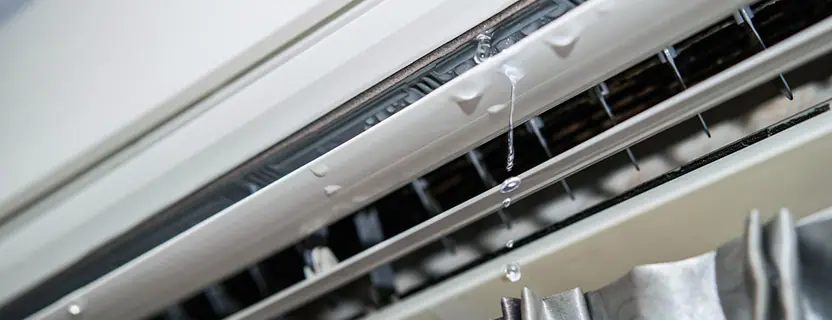
Air conditioning is critical for homeowners in the southeast, where sweltering temperatures and sticky humidity are typical. But when your AC unit leaks, it could mean a serious issue that keeps your system from working correctly when you need it most. If you notice significant water dripping from your home’s AC or pooling below the unit, calling professionals can help prevent costly damage and keep your house cool and comfortable.
Learn how to address AC leaks and preventive measures to keep them from happening.
Air conditioner leaks are a common problem that can cause costly damage to your home. In the southeast, high humidity levels and frequent AC use can increase the risk of leaks. Leaks can be more than bothersome — they can damage your home, cause costly repairs and lead to potential health hazards like mold growth.
Here’s how an AC system works:
AC drain pipes lead out of your home, so you won’t discover leaks as long as these pipes function correctly. However, several factors can cause the system to stop working and lead to an AC water leak, which can occur even if just one part isn’t working correctly.
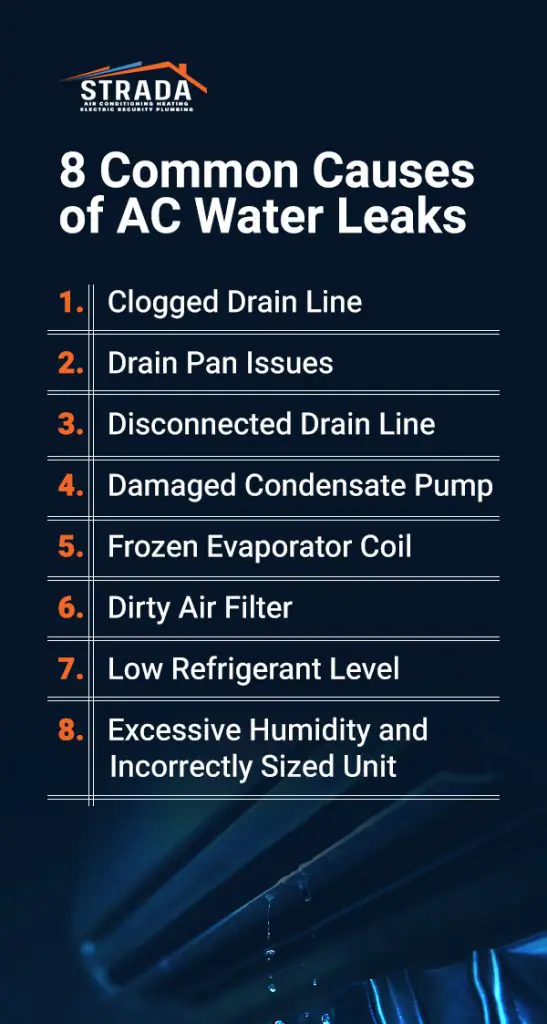
Several factors can contribute to your AC unit leaking water, including clogged condensate lines, frozen evaporator coils and improperly installed drain pans. You might notice signs of a leak, including water stains on the walls or ceiling, higher indoor humidity, and mold or mildew growth.
Inspect your unit for the following causes of leaks:
A clogged drain line in your AC unit will prevent it from adequately emptying drain pans. A clog can occur from built-up dirt and debris, making it challenging for water to escape outside the home properly. While it can be tempting to try to clear the line on your own, it’s best to call a professional as soon as you notice a clog to prevent damaging the AC.
Older AC drain pans can rust, preventing the dripping water in your unit from reaching the condensate line. If the flow is obstructed, water can leak. An improperly installed drain pan can also cause water to escape into your home.
Since the drain pan is designed to channel water into the drain line, a break or disconnection in this line can result in water leaking inside your home, diverting it from its intended outdoor exit.
A damaged condensate pump can lead to a leaking AC unit. While it doesn’t necessarily mean the pump is poor, it could indicate a drainage issue or clog that causes water to back up and overflow, leading to water damage.
Improper maintenance can cause evaporator coils to freeze. Over time, the coils can become dirty, making them inefficient at pulling heat from the air. When the condenser compresses cool refrigerant instead of warm refrigerant, it can cause the refrigerant or condensation outside the coils to freeze.
A refrigerant leak can also cause frozen evaporator coils since the remaining refrigerant has more room to expand, causing a runaway cooling effect.
When this ice thaws, the excess water can overwhelm the drain pan and cause leaks.
If you think this is the cause of your AC leaking, you can turn it off and see if the coils thaw. However, temperatures in the southeast can be intolerable without functioning AC, and calling professionals is the best way to tackle this problem quickly.
A dirty air filter causes AC units to work harder to cool your home. That extra strain makes it challenging for air to reach the evaporator coils, causing them to freeze and leak. Be sure your air vents are clear and not blocked by debris, and replace your filters frequently to improve air quality and prevent water damage.
If your AC does not have enough refrigerant, it may leak water. You’ll likely hear a hissing or bubbling sound to indicate low levels, or your home may feel warmer than usual, leading to high energy bills.
In the southeast, high humidity can lead to excessive condensation. If your AC unit is not correctly sized for your home or was improperly installed, it will be unable to manage the humidity — increasing the risk of leaks. If not properly drained, you might notice water leakage or built-up water beneath the unit that can damage walls or ceilings.
If the AC unit is too big or small for your home, it cannot regulate circulation properly. Professionals can replace the system to ensure your home is correctly cooled.
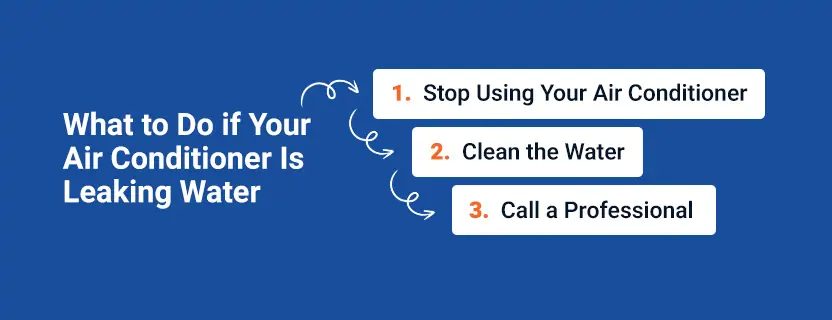
If you notice an air conditioner leak, turn off the system immediately to prevent further damage. Professional AC technicians can determine the source of the issue and the steps needed to get it working again. Sometimes, you might need to repair or replace your leaking AC. In others, your unit might require cleaning or drain line clog removal.
Follow these steps if your AC unit is leaking water:
Your air conditioner will not work correctly if it is leaking. If you notice dripping water, immediately turn it off to prevent harm to the system or water damage to your home.
If you notice pooling water or moisture around your air conditioner, clean it quickly. If left untreated, the water can start smelling musty, damage your floor and lead to mold growth, which can quickly spread throughout your house.
Call professionals to determine the cause of the leak and repair your AC unit properly. They’ll also check the wiring and electrical connections for signs of corrosion, which could lead to problems in the future.
When choosing your AC company, look for those with robust credentials and a history of positive customer feedback. These professionals are more likely to provide comprehensive service plans with routine inspections, cleaning and preventive repairs to keep your unit running all season.
While it’s tempting to handle AC issues yourself, it’s crucial to understand the limitations of DIY repairs. Professional maintenance is essential for the longevity and efficiency of your AC unit, and a qualified technician can prevent future leaks with routine checks and repairs.
Air conditioners are complex systems that involve electrical components, refrigerants and pressurized gases. Handling these without proper training can lead to electrocution or cause a catastrophic event. Professionals have the training and experience to manage these risks.
AC technicians use specialized tools and equipment to accurately diagnose and repair AC water leaks. Without these tools, you might not be able to identify the problem correctly or cause further damage to the system. Knowing that a trained professional has handled the repair allows you to rest easy, confident that your AC system is operating safely and efficiently.
Air conditioners have intricate mechanical and electronic systems that require a thorough understanding of troubleshooting and repairing. AC professionals have the technical knowledge and experience to diagnose issues quickly and accurately, fixing the root cause to prevent costly repairs down the road.
Improper handling of a water leak could damage your property’s structure, including walls, ceilings and floors. Professionals ensure that leaks are managed effectively to prevent such damage.
Professionals can perform a comprehensive diagnosis that may reveal underlying problems that aren’t immediately apparent. DIY repairs might address symptoms rather than the cause, leading to recurring issues.
While it may seem cost-effective to attempt a repair yourself, improper fixes can lead to more significant problems, resulting in higher costs in the long run. Professional repairs ensure the issue is fixed correctly the first time, saving time and money.
Additionally, the manufacturer’s warranty is usually void if a professional technician does not perform repairs. DIY repairs could lead to a loss of warranty coverage, which can be costly if major issues arise later.
Fortunately, there are ways to prevent AC leaks when temperatures rise. Regular inspections, professional maintenance and seasonal preparations can help you save on repair or damage costs and ensure a cool, comfortable home.
Seasonal preparations can ensure your AC remains efficient and leak-free, especially in extreme climate regions. Before hurricane season:
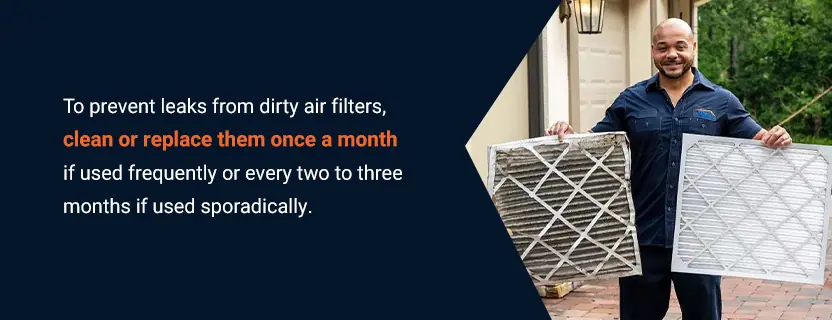
To prevent leaks from dirty air filters, clean or replace them once a month if used frequently or every two to three months if used sporadically. If you have reusable filters, rinse them under warm water until the water runs clear. Allow them to dry completely before reinserting them into the AC. If the filters are worn out, excessively dirty or moldy, replace them entirely.
You’ll want to protect your AC from heavy rains during hurricane season. Here’s how to do so:
You must regularly inspect your AC unit to prevent leaks. Look for:
Other signs of leaks include the sound of dripping water, the hum of a struggling unit or musty odors that indicate mold growth.
The most important thing you can do to prevent your air conditioner from leaking water is to schedule routine maintenance care, especially before the summer. Professionals can service your AC unit to prevent problems from occurring during the hottest, most humid time of the year.
The following are our answers to frequently asked questions we receive about AC water leaks:
Common signs of leaks include:
Yes, persistent moisture from an unchecked leak can create an ideal environment for mold and mildew to grow, harming your health and the structure of your home.
It is recommended that your HVAC or AC system be serviced by a professional at least twice a year, especially in the spring before the high-demand summer season in the southeast.
High humidity can cause your AC unit to work harder. If not adequately managed by a well-maintained and correctly sized AC system, it may lead to excessive condensation, contributing to water leaks.
Yes, water leaks can be a sign of an inefficient system. If your AC is leaking water, it’s likely not running at peak efficiency, which can raise your energy bills.
Securing your outdoor AC unit and ensuring proper drainage is critical in hurricane-prone areas. A professional can provide services to help prepare your AC system for the severe weather that is common in the southeast.
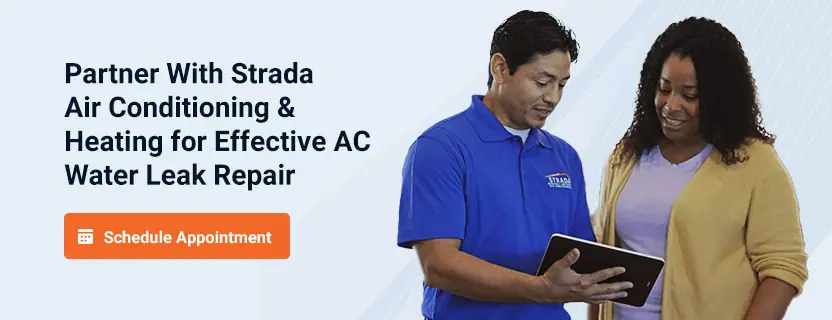
A leaking air conditioner is more than an inconvenience — it’s a sign of issues that could lead to costly problems, especially in the southeast’s demanding climate. Whether it’s the high humidity of summer or the battering rains of hurricane season, your AC unit needs to be at its best. Trust the technicians at Strade Air Conditioning & Heating to provide the preventive care and expert repairs necessary to keep your system running smoothly year-round.
Our experienced technicians have the knowledge and expertise to provide quality services and peace of mind, ensuring that your AC unit is leak-free and efficient when it matters most. We proudly serve homeowners across the southeast and surrounding areas with top-quality AC inspections, maintenance, repairs and replacements. Call 866-200-2854 or schedule services today and take the first step toward a cooler, more comfortable home.